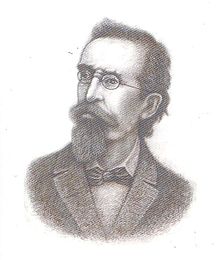Johann Georg Obrist
Johann Georg Obrist (born May 26, 1843 in Jenbach , Austrian Empire , † April 18, 1901 in Innsbruck , Austria-Hungary ) was an Austrian teacher and poet.
Life
As the son of a master miller, Obrist attended elementary school in Jenbach and high school in Innsbruck. His teacher Adolf Pichler noticed and promoted Obrist's lyrical talent. After graduating from high school , Obrist studied German at the University of Innsbruck and became a member of the Corps Rhaetia (like his son Walter later) .
After the triennium (six semesters) he voluntarily joined the Academic Legion that took part in the battle for Venice in the Austro-Italian war . He founded the short-lived weekly “Die Dorflinde” , in which he published numerous poems and novels .
By 1869 Chernivtsi come, he was five years supplent at the Greek Orthodox secondary school . He got to know Karl Emil Franzos , who had already studied law in Vienna, but kept coming back to Czernowitz. The two forged extensive literary plans, including the publication of the “Buchenblätter” , the yearbook for German literary endeavors in Bukovina . This almanac was founded by Wilhelm Capilleri in 1864 and published by Franzos in 1870. In it, Obrist published, among other things, poems with motifs from Bukovina ( "Am Pruth" ). He dedicated his first volume of poetry, "Georginen" , to his teacher Pichler. The volume also contained adaptations from the East Slavic languages ( Pushkin , Worobkiewicz ). Obrist's interest in Ukrainian culture is thanks to the first foreign language book edition of Taras Shevchenko's works .
In 1871 Obrist was able to publish the third almanac of the beech leaves before he was transferred to the grammar school in Trautenau in Bohemia in 1873 . In 1875 he returned to Innsbruck and took a position as an amanuensis at the Innsbruck University Library . At the same time he edited the magazine “Der Bote für Tirol und Vorarlberg” and was involved with the “Fliegende Blätter” , the “Album des literary club Nürnberg” , the “Frankfurter Dichtergarten” and other press organs.
Obrist's last years were overshadowed by conflicts with Innsbruck's clergy . He was seen as a dangerous dissident who undermined the foundations of the Catholic faith with his utterances and works . The clashes cost Obrist a lot of strength and drove him to an early death. His estate is in the Innsbruck City Archives and is waiting for his researchers.
Publications
- Taras Grigoriewicz Shevchenko. A small Russian poet. His life sketch and appendix, consisting of samples of his poetry, freely adapted .
- Chernivtsi walks
- Jutta von Straßberg
- For Igls! New poems by JG Obrist , 1883
- Hippolyt Guarinoni - On the history of Tyrolean culture , 1867
- The poet Hermann von Gilm: A biography , 1874
- Robert Lechleitner: A Tyrolean autodidact , 1878
literature
- G. Weiß: .pdf Colonel Johann Georg. In: Austrian Biographical Lexicon 1815–1950 (ÖBL). Volume 7, Verlag der Österreichischen Akademie der Wissenschaften, Vienna 1978, ISBN 3-7001-0187-2 , p. 200.
- Peter Rychlo , Oleg Liubkivskyj: Czernowitz City of Literature , 2nd, improved edition. Chernivtsi 2009, pp. 51–55.
Web links
- Literature by and about Johann Georg Obrist in the catalog of the German National Library
Individual evidence
- ^ Walter Obrist: Johann Georg Obrist. Biographical sketch . In: South Tyrol. Pictures of memory . Innsbruck 1926, p. 10
| personal data | |
|---|---|
| SURNAME | Colonel, Johann Georg |
| ALTERNATIVE NAMES | Braun, Erich; Jenbach, Hans von |
| BRIEF DESCRIPTION | Austrian philologist, author and teacher |
| DATE OF BIRTH | May 26, 1843 |
| PLACE OF BIRTH | Jenbach |
| DATE OF DEATH | April 18, 1901 |
| Place of death | innsbruck |
